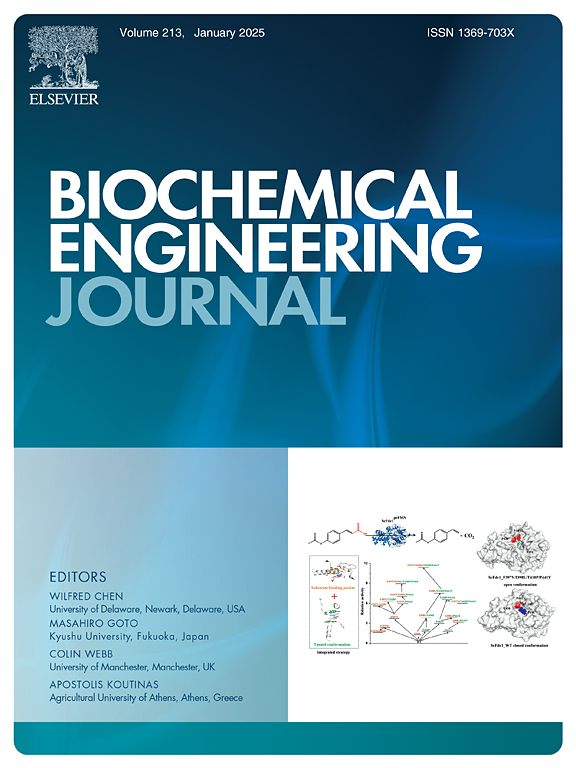Synergistic acetyl-CoA augmentation strategy (SATS) for improved terpenoid biosynthesis in Saccharomyces cerevisiae
IF 3.7
3区 生物学
Q2 BIOTECHNOLOGY & APPLIED MICROBIOLOGY
引用次数: 0
Abstract
Terpenoids are widely applied in pharmaceuticals, fragrances and biofuels. Acetyl-CoA, as a crucial precursor in the mevalonate pathway, is stringently regulated intracellularly, thereby limiting the biosynthesis of terpenoids. This study develops a synergistic acetyl-CoA augmentation strategy (SATS) to establish a robust platform for terpenoid biosynthesis in Saccharomyces cerevisiae. Optimizing coenzyme A biosynthesis via global regulation of the pantothenic acid module improved intracellular acetyl-CoA levels by 3.26-fold. Enhancing acetyl phosphate supply was achieved by constructing a PPP-PK-PTA pathway, which improved intracellular acetyl-CoA by 1.92-fold. By combining these techniques, acetyl-CoA levels in the SATS-engineered strain increased by 6.03-fold. The titer of amorpha-4,11-diene, a representative terpenoid, rose by 37.77-fold to 188.45 mg/L in shake-flask fermentation and reached 13 g/L in a 5 L bioreactor. Furthermore, the modified strain exhibited enhanced production of other terpenoids. Our research indicates SATS is an effective approach for synthesizing terpenoids and other acetyl-CoA-derived compounds, demonstrating broad applicability.
乙酰-CoA 增效战略(SATS)用于改善酿酒酵母中的萜类化合物生物合成
萜类化合物广泛应用于制药、香料和生物燃料领域。乙酰-CoA作为甲羟戊酸途径中的重要前体,在细胞内受到严格调控,从而限制了萜类化合物的生物合成。本研究开发了一种协同乙酰辅酶A扩增策略(SATS),为酵母中萜类化合物的生物合成建立了一个强大的平台。通过泛酸模块的全局调控优化辅酶 A 的生物合成,细胞内乙酰-CoA 水平提高了 3.26 倍。通过构建一个 PPP-PK-PTA 途径来增加乙酰磷酸的供应,从而将细胞内乙酰-CoA 的含量提高了 1.92 倍。结合这些技术,SATS 工程菌株的乙酰-CoA 水平提高了 6.03 倍。在摇瓶发酵中,具有代表性的萜类化合物 amorpha-4,11-二烯的滴度上升了 37.77 倍,达到 188.45 mg/L,在 5 L 生物反应器中达到 13 g/L。此外,改良菌株还提高了其他萜类化合物的产量。我们的研究表明,SATS 是合成萜类化合物和其他乙酰-CoA 衍生化合物的有效方法,具有广泛的适用性。
本文章由计算机程序翻译,如有差异,请以英文原文为准。
求助全文
约1分钟内获得全文
求助全文
来源期刊

Biochemical Engineering Journal
工程技术-工程:化工
CiteScore
7.10
自引率
5.10%
发文量
380
审稿时长
34 days
期刊介绍:
The Biochemical Engineering Journal aims to promote progress in the crucial chemical engineering aspects of the development of biological processes associated with everything from raw materials preparation to product recovery relevant to industries as diverse as medical/healthcare, industrial biotechnology, and environmental biotechnology.
The Journal welcomes full length original research papers, short communications, and review papers* in the following research fields:
Biocatalysis (enzyme or microbial) and biotransformations, including immobilized biocatalyst preparation and kinetics
Biosensors and Biodevices including biofabrication and novel fuel cell development
Bioseparations including scale-up and protein refolding/renaturation
Environmental Bioengineering including bioconversion, bioremediation, and microbial fuel cells
Bioreactor Systems including characterization, optimization and scale-up
Bioresources and Biorefinery Engineering including biomass conversion, biofuels, bioenergy, and optimization
Industrial Biotechnology including specialty chemicals, platform chemicals and neutraceuticals
Biomaterials and Tissue Engineering including bioartificial organs, cell encapsulation, and controlled release
Cell Culture Engineering (plant, animal or insect cells) including viral vectors, monoclonal antibodies, recombinant proteins, vaccines, and secondary metabolites
Cell Therapies and Stem Cells including pluripotent, mesenchymal and hematopoietic stem cells; immunotherapies; tissue-specific differentiation; and cryopreservation
Metabolic Engineering, Systems and Synthetic Biology including OMICS, bioinformatics, in silico biology, and metabolic flux analysis
Protein Engineering including enzyme engineering and directed evolution.
 求助内容:
求助内容: 应助结果提醒方式:
应助结果提醒方式:


